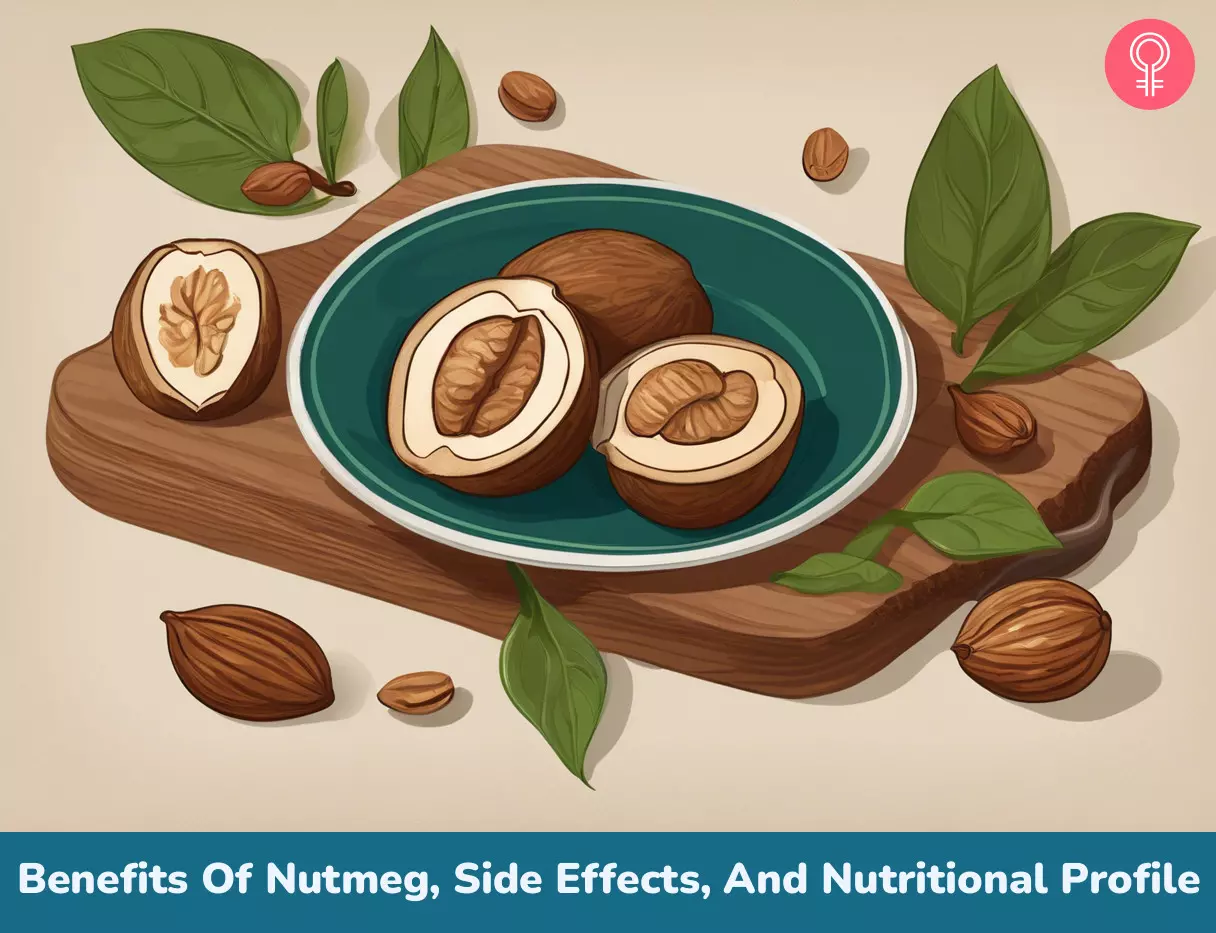Nutmeg effectively manages the wellness of your body as it regulates blood sugar levels, combats high blood pressure, and lowers cholesterol. These positive effects can be attributed to the bioactive compounds in it. It also relieves stress and anxiety with its psychotropic property. In this article, you will learn all about nutmeg, the benefits it offers, its nutritional profile, and the side effects associated with consumption. Keep reading!
What Is Nutmeg?
Nutmeg is a nutrient-dense, aromatic spice that is made from the seeds of the nutmeg tree (scientifically called Myristica fragrans). It is native to Indonesia (1). It has a warm and spicy flavor, which is why it is popularly used in cooking, baking desserts (like apple pie), beverages (like mulled wine), and as a garnish on certain coffee drinks. It goes quite well with creamy and cheesy dishes. Let’s check out all the health benefits it provides in the next section. Who Can Use It? Anyone except pregnant and breastfeeding women and those who are taking sedatives can consume it in small amounts or topically apply a paste to treat acne. How Often? You can consume it daily but in moderation. Caution Overconsumption of nutmeg may cause symptoms like hallucinations, dry mouth, dizziness, and nausea.
What Are The Health Benefits Of Nutmeg?
1. May Help Reduce Cancer Risk
Sources state that the essential oil of nutmeg can act as an antioxidant and may assist in preventing cancer in the process. The oil has powerful free radical scavenging activity and can be used to develop anti-cancer drugs. Other studies have shown that nutmeg may aid the prevention of colon cancer by decreasing intestinal tumorigenesisi A complex process of the formation of cancer cells from normal cells in 3 stages: Initiation, progression, and metastasis. (2), (3).
2. May Aid Diabetes Treatment
Nutmeg is a rich source of antioxidants. In rat studies, nutmeg, along with other spices, was found to decrease blood glucose levels significantly. The extracts of nutmeg were found to have beneficial effects on blood glucose levels. However, more studies are needed to project nutmeg as a potential treatment for diabetes (4). Studies also show that oil may relieve symptoms of chronic inflammatory pain, which could be a serious concern for people with diabetes (5).
3. May Control High Blood Pressure
Studies on nutmeg have shown that it contains several essential oils, such as linalool. Linalool is a strong vasodilator of smooth muscles, including blood vessels, and can help in lowering high blood pressure. Animal studies confirm the linalool’s ability to reduce overall blood pressure (6). These effects need further experimental validation on humans.
4. May Relieve Arthritis Pain And Inflammation
Nutmeg has shown to ease chronic inflammatory pain, which is the primary characteristic of arthritis. The anti-inflammatory properties of nutmeg can reduce joint pains and inflammation associated with arthritis (5). The seed contains high quantities of myristicin, elemicin, and eugenol, which could be the reason for its anti-inflammatory properties (7).
5. May Treat Insomnia
Nutmeg may also help with stress relief, and this may aid insomnia treatment (8). This seed contains myristicin and elemicin. These prominent compounds in nutmeg work together to relax the human brain. The seed itself also can act as a mild sedative. A product containing nutmeg as one of the primary ingredients was found to improve mood and help treat insomnia (1). The spice was also used in ancient medicine as a way to de-stress and calm one’s mind. Tim Birchard, a blogger, shares his experience of experiencing side effects due to nutmeg before figuring out the correct dosage to use as a sleeping aid. He writes, “Woke up about 5:30 to pounding heart, disorientation, dizziness, nausea, and a host of other side effects (i).” After a lot of trial and error, he figured out the right dosage for good sleep. He continues, “For the past year I have (very carefully) experimented with taking 1/4 teaspoon (tsp) of ground nutmeg with water before bed. I have had consistently favorable results. No negative side effects, and improved sleep without added drowsiness the next morning.”
6. May Improve Digestion
According to some studies, the essential oils in nutmeg have a carminative effect, which may assist in reducing flatulence. Nutmeg can relieve issues like diarrhea (9). It also contains fiber, which may help with bowel movements (9).
7. May Ease Pain
Nutmeg oil is often used to treat spasms and pain. It is topically applied for pain relief, particularly in the muscles and joints. Another volatile oil in nutmeg, eugenol, has anti-inflammatory properties and may help alleviate pain associated with inflammation (5).
8. May Lower Cholesterol Levels
According to a rat study, nutmeg possesses cholesterol-lowering potential and protective ability (10). The study also suggests that nutmeg extracts could help reverse liver toxicity caused by high cholesterol diets.
9. May Improve Dental Health
Nutmeg is a powerhouse of antibacterial properties that potentially contribute to oral health. The spice is known to treat dental issues, including dental caries. It fights pathogens like Streptococcus mutans that can cause oral infections (3).
10. May Treat Depression And Anxiety
Rat studies showed that nutmeg might also work as an antidepressant, potentially assisting in reducing symptoms of depression by boosting serotonin (11). However, it is important to note that nutmeg does not replace medical treatment that may include medications, therapy, or both. The spice is basically a brain tonic that stimulates your brain function. It also helps eliminate mental fatigue and stress and boosts mental activity (12). In addition, nutmeg has the ability to promote the production of serotonin and dopamine in the brain. This could help the human body and brain fight depression and anxiety biochemically. Dr. Peter Brukner, a Registered Nutritionist and Specialist Sports and Exercise Physician, says, “Nutmeg has special things in it that might make memory and focus better. These substances, like myristicin, help in lowering stress and inflammation in the brain. Therefore, sprinkling a bit of nutmeg on your morning oatmeal or smoothie might be an enjoyable method to maintain mental sharpness as you age.”
11. May Help Fight Acne
Nutmeg exhibits strong antibacterial and antifungal activities – and this may help in reducing acne. Nutmeg has been used externally to treat skin infections, rheumatism, and paralysis (1). The spice has traditionally been used as a skin whitening agent, and a patent is underway that uses the extract of nutmeg in its chemical formulas (13). The lignan found in nutmeg evens the pigmentation in the skin by inhibiting melanin production. Additionally, nutmeg also helps improve immunity, respiratory health, and hair health, and aids in weight loss. These are the benefits of nutmeg. Below is a detailed nutritional profile of nutmeg.
What Is The Nutritional Profile Of Nutmeg?
*values sourced from Scientia Agriculturae Nutmeg can be consumed in various forms to enhance the flavor of food. Learn more about them in the next section.
How To Use Nutmeg
Ground Nutmeg: This is the most common form of nutmeg and is readily available. It is a popular addition in many recipes and imparts a warm, slightly sweet flavor. Whole Nutmeg Seeds: Grate these seeds with a fine grater as needed for a fresh, intense flavor. It enhances the aroma and flavor of your dishes. Nutmeg Oil: This concentrated oil, extracted from the seeds, is used in the food industry to flavor various products like syrups, sauces, and baked goods. Nutmeg Butter: Nutmeg powder is mixed with cooking butter to create a flavorful butter that can be used as a spread or for cooking.
If you want to make nutmeg a regular part of your diet, you need to know how to store it the right way. Keep it in an airtight container in a cool, dark place, like a pantry or cupboard. Whole nutmeg seeds last longer than ground nutmeg, so consider buying whole nutmeg and grating it as needed. This will help preserve its flavor and aroma for a longer time. Nutmeg can be consumed in numerous forms. But this does not mean you can consume as much of it as you want.
How Much Nutmeg Is Safe Per Day?
Prolonged use of nutmeg, in doses of more than two spoons per day (15 g), may cause hallucinations, dizziness, acute nausea, dry mouth, and agitation. Cases of overdose have been reported in the literature (14), (15). Here are the side effects of nutmeg.
What Are The Side Effects Of Nutmeg?
Hallucinations And Other Mental Side Effects
Chronic consumption of nutmeg is associated with tachycardiai A medical term for heart rate above 100 beats a minute. It can be risky depending on age and level of exertion. , nauseai An uneasy and uncomfortable feeling in the stomach that causes an urge to vomit but does not lead to vomiting. , vomiting, agitation, and hallucinations (14). This toxicity has been attributed to the myristicin oil present in nutmeg. Studies have suggested keeping the spice out of children’s reach due to safety concerns.
Issues During Pregnancy And Breastfeeding
Excess consumption of nutmeg can cause miscarriages or birth defects (16). There are no studies reporting the effects of nutmeg consumption on breastfeeding. Hence, avoid nutmeg in both instances. In rare cases, excess consumption of nutmeg can lead to death. Nutmeg can be enjoyed in versatile ways.
How To Use Nutmeg
Apart from using it as a spice, you can also consume nutmeg tea to enjoy its health benefits. Nutmeg can also be incorporated into skin and oral routines in the following ways.
How To Prepare Nutmeg Tea
Add nutmeg powder (less than 3 g) to boiling water along with a piece of ginger. Allow it to steep for 2 to 3 minutes. Strain and sip on the tea. You can also add a pinch of nutmeg to a glass of warm milk and drink it before bedtime to aid better sleep.
How To Use Nutmeg To Treat Acne
Using it for treating acne is simple. You need to crush two to three nutmeg seeds and add a little milk to make a paste. Wash your face with warm water and then apply it to your face. Leave it on for a couple of hours before washing your face with cool water.
How To Use Nutmeg For Oral Health
You can brush your teeth with a mixture of a little nutmeg powder and a small amount of oregano oil. Repeat this several times per week. What are the potential benefits of nutmeg for the nervous system? Dr. Peter says, “Your nervous system manages everything your body does, and nutmeg might assist in keeping it healthy. The substances found in nutmeg could shield your brain cells from harm, which is very important. Also, nutmeg has relaxing effects that can help lower stress and worry. If you are feeling very stressed or anxious, a warm drink with some nutmeg might assist in calming you down and making you feel more comfortable.” How can nutmeg help to soothe a sore throat? Dr. Peter says, “This spice is good for reducing inflammation, so it helps reduce swelling and irritation in the throat. Easy remedy is to mix small nutmeg with honey and warm water for a soothing drink. Not only does it taste good, but it also helps to keep you hydrated. This is very important for feeling better.” Does nutmeg have anti-microbial properties? Dr. Peter says, “Nutmeg is also famous for its power to fight against harmful germs. Some research shows it can halt the growth of specific bacteria and fungi, which helps protect your body from infections. The main oils inside nutmeg, like eugenol, make it very good at fighting germs. When you put nutmeg in your food, it not only makes the taste better but also helps keep your immune system strong.” What is a good substitute for nutmeg? Mace is the closest substitute for nutmeg. Mace is nothing but the outer membrane of the nutmeg seed before it is harvested, which is why it has a similar flavor. Also, when compared with nutmeg benefits, mace spice benefits are quite similar. How long does nutmeg high last? It can also lead to a high, often called ‘nutmeg high.’ Nutmeg high has been reported to last for two days with symptoms similar to that of a hangover. Caution should be taken when operating heavy machinery or other activities like driving while under the influence of nutmeg because of its psychoactivei Substances that change the function of the nervous system and alter perception, mood, and behavior. nature. Can you smoke nutmeg? Yes, but you shouldn’t do it as smoking nutmeg is dangerous. Is nutmeg good for your kidneys? No, animal studies suggest that excessive intake of nutmeg can prove to be detrimental to your kidneys. It can have a toxic effect and even impede metabolic functions. However, further studies are warranted to understand this link further (17). Does nutmeg detoxify the body? Yes, nutmeg helps flush out toxins from the liver and kidneys, thus naturally detoxifying the body (18). Is nutmeg good for your heart? Yes, nutmeg may increase blood circulation and improve the overall functioning of the heart (19) Can nutmeg damage your liver? Animal studies suggest that nutmeg may damage the liver and negatively impact liver function (20). However, clinical trials need to be conducted to understand the association further. Does nutmeg help with stroke? Research suggests that nutmeg essential may help reduce blood pressure levels which can reduce the risk of getting a stroke (21), (22).
Illustration: Benefits Of Nutmeg Side Effects And Nutritional Profile













